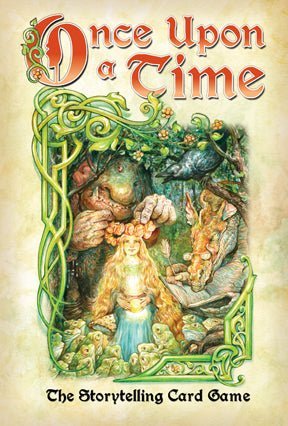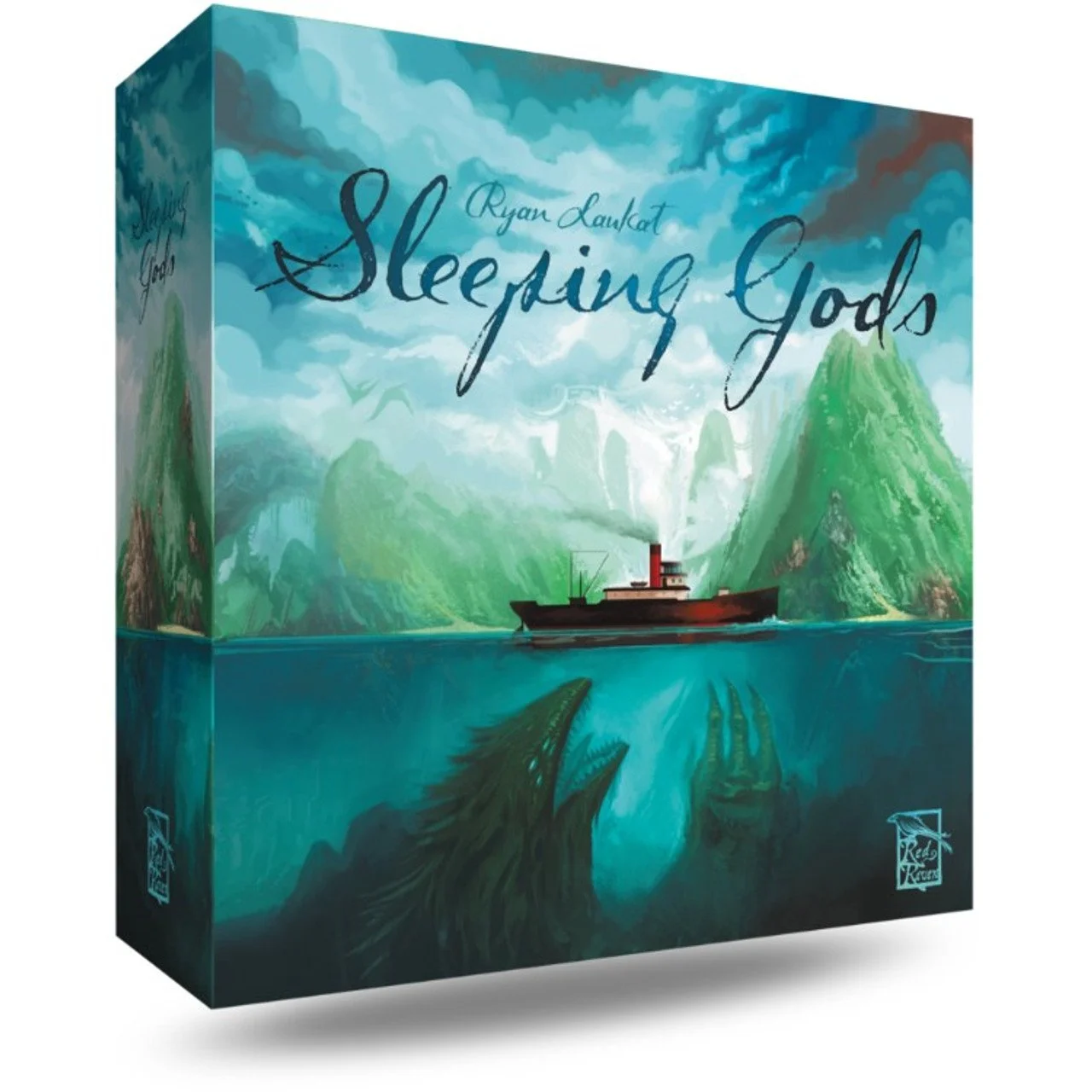6 Top Storytelling Board Games
And every tale has 2 sides: the teller and the listener. For creative folks, the joy of crafting narratives and weaving rich worlds out of nothing but the fabric of imagination-- that’s the stuff!
Luckily, there are games that give us the opportunity to indulge in that imaginative practice. If you’re a storyteller, or a creative person of any kind, these games might be for you.
This blog post explores 6 games for storytelling. To be clear, it’s not about games that have the richest stories-- it’s about those that give storytellers the richest opportunities. The games aren’t ranked in any particular order, but at the bottom there are some charts to help you compare.
Each game has a 1-5 rating for:
Depth of Experience: How rich is the gameplay in general? Is it something you can get better at? Does it offer growth and immersion? Or is it more a quick, fun, simple experience? Do you prefer lighter games or heavier ones? Both are valid!
Easy to get into: How much learning do you have to do before you can start? How many moving pieces are involved?
Win/loss potential: Is the game more sandbox-style, with no clear win/loss conditions, or does it have clear objectives and success/failure states? Which do you prefer?
Structured vs. Open-ended stories: How much room is there for storytellers to flex their muscles? Is the game more about rich free-form worldbuilding or about operating within certain bounds?
A 2-6 player competitive card game where players win by telling stories using all of the cards in their hand. Players can take over the role of storyteller by playing their cards right, or if the current storyteller stumbles. All about the story, Once Upon a Time is a great party-style game for storytellers. Once Upon A Time has simple rules and is quick to learn.
Great for: Players of all ages, people looking for silly fun, storytelling on the go, people into competitive storytelling
Depth of Experience: 3. Definitely can get better at it. Lots of richness for a party style game.
Easy to get into: 4. Quick to learn, and each game is fast.
Win/loss potential: 3. Competitive game, but the rules leave lots open to interpretation, and players can easily disagree about whether a player’s story is ‘connected enough’.
Structured vs. Open-ended stories: 3.5 The setting is fixed (fairy tale), but there’s a huge amount of creative license.
Definitely the simplest of these games, Rory’s Story Cubes are a bunch of dice with different symbols on them. You roll the dice and tell stories involving the symbols that show up. There’s not really a winner or loser, just lots of opportunities for creativity and fun. The dice themselves can also be incorporated as a device into other games, or as a way to kickstart your creative process.
Great for: Creatives looking to circumvent writing block, travel-friendly gamers, families with younger kids, people looking more for ‘play’ than for a 'game’
Depth of Experience: 2. Incredibly simple, but fun nonetheless!
Easy to get into: 5. With so little to learn, just roll the dice and go.
Win/loss potential: 1. No real win/loss mechanic.
Structured vs. Open-ended stories: 4 The only real limitation is the number of symbols and dice.
3. Sleeping Gods (also, Above and Below, Near and Far)
Sleeping Gods, Above and Below, and Near and Far were all published by Red Raven Games and designed by Ryan Laukat. They’re incredibly rich euro-style games where the focus is on strategy and challenging gameplay. Although storytelling isn’t the core mechanic of the game, all 3 games come with storybooks to help provide challenges and resolve challenges players encounter.
While the meat of the stories come already there in the storybooks, players nonetheless have rich opportunities to elaborate and string together their own larger meta-narrative. This is particularly true in Sleeping Gods, a collaborative game with nautical exploration themes. Your game and story keep expanding every time you play!
Great for: Traditional gamers who love a good story, euro-style game lovers, strategy gamers, mechanic-heavy gamers, TTRPG players who lost their DMs in a mysterious whirlpool
Depth of Experience: 5. Incredibly deep and rich gameplay that evolves over many play sessions.
Easy to get into: 2. Not too complicated at all. It’s just that setup and learning the array of mechanics takes more time than other games on this list.
Win/loss potential: 5. Largely focused on the euro-style gameplay, these games have clear win-loss conditions.
Structured vs. Open-ended stories: 2 While these games have rich narratives, the narratives are there already. Exploration is entirely open-ended, but creating the stories isn’t. The opportunity for open-ended storytelling comes down to connecting the dots and creating overarching metanarratives.
Note: Arabian Nights and Forgotten Waters are not on this list-- although they’re excellent games, they’re similar enough to Sleeping Gods, in that they have storybooks that come with them, and the creative ‘storytelling’ part of the game comes down to connecting the dots.
4. Gloom
Gloom is a card game about creating the most miserable fates for a family. It’s grim, dark, and hilarious. While storytelling is optional in the game, it nevertheless provides opportunities for storytellers to engage their imaginations and explain how their families met their grizzly demises.
Great for: People who love dark gothic humor, fans of set building games, people looking for portable games, story-optional gamers
Depth of Experience: 2.5. Lots of fun and room for strategizing, but still mostly a party-style game.
Easy to get into: 4. Straightforward mechanics and fast gameplay.
Win/loss potential: 5. A competitive game at its core, the rules are simple. It’s just that storytelling doesn’t contribute to whether you win or lose.
Structured vs. Open-ended stories: 2 The storytelling experience comes in play for explaining what led your characters to their deaths. You’re given the dots to connect, but there’s still lots of meat you can string on those bones.
Before There Were Stars is a lovely card-based game where players take turns crafting myths based on cards they draw. Not quite a party game, Before There Were Stars is played over a series of quick rounds. Each round involves additional cards and advancing their myths. Players vote on each-others’ stories to determine the winner-- it’s competitive rather than collaborative.
Great for: Fans of mythology, storytellers, people looking for quick story-driven games, creative problem-solvers
Depth of Experience: 3. The better you get at telling stories, the better you get at the game. Because winners are based on voting, however, players may naturally handicap each-other. With such simple gameplay, the depth of experience is limited, but that doesn’t count against how fun the game can be.
Easy to get into: 4. Fast to learn, but people without storytelling experience or who are introverted may experience road bumps at first.
Win/loss potential: 3.5. Yes, it’s a competitive game. But because players vote on who should win, there’s potential for players to handicap each-other or hold each-other to different standards, which makes playing to satisfy a competitive drive harder.
Structured vs. Open-ended stories: 4.5 There are really no restrictions on how players construct their stories, as long as players use the symbols on their cards. Slivers of a point off for the game being capped to focus on myths, but house rules can address that.
6. Inventures
Inventures is an upcoming collaborative adventure game focused on storytelling and creativity. Somewhat of a love child between Dungeons & Dragons and Dixit, the game relies on a powerful and novel symbol interpretation mechanic.
Players have to guess which set of symbols best represents how another player’s character might solve a problem. Unlike heavier tabletop RPGs, Inventures has no DM or character stats to track.
Great for: Strong storytellers, groups looking to create adventures together, fans of TTRPGs, fans of Dixit, artists, families with older kids
Depth of Experience: 4.5 Teamwork is key. The more you play with the same group of people, the better your team will do. The game involves creating your own artwork (optional) and building out rich worlds and characters that evolve each time you play.
Easy to get into: 2.5. Although the rules are simple, there’s a lot of nuance to master and turns involve multiple phases. Still easier to learn than games with more moving parts.
Win/loss potential: 4. Inventures is a collaborative game with a clear win/loss condition. There are different difficulty settings to try; at the hardest difficulties, your team will probably lose. However, the game is more about the adventure than the destination.
Structured vs. Open-ended stories: 4. Storytelling is absolutely the core of this game. The better you are at telling stories, the more likely your team will be to win. Symbol and challenge cards provide the input to the story creation process, acting as guide rails. Games can take place in any setting, from fantasy to sci-fi to realistic and beyond. A point off because all stories take the shape of adventures.
Any we missed? Drop us a line at Alexander (at) BirtleGames (dot) com







